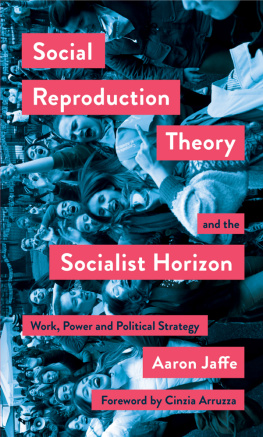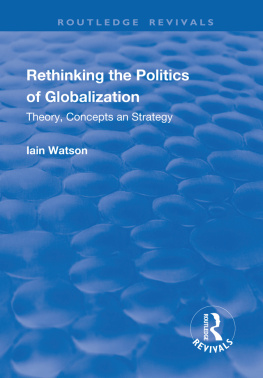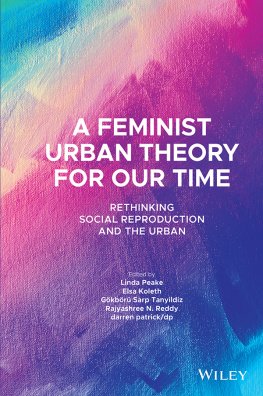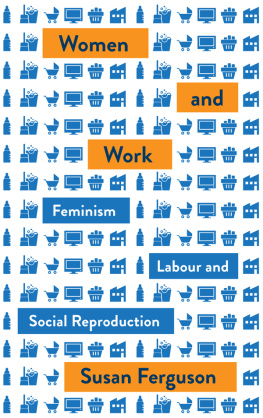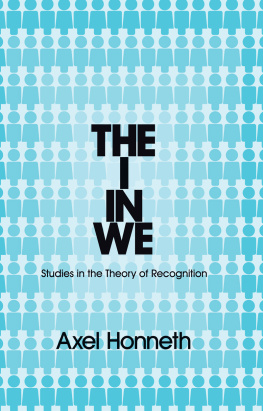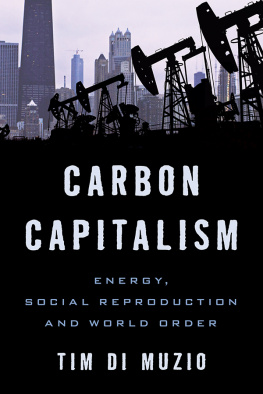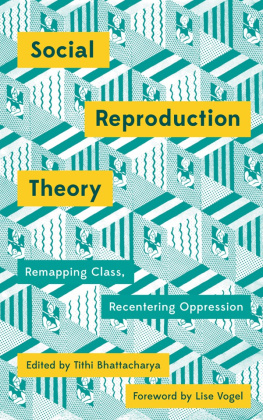Social Reproduction Theory
and the Socialist Horizon
Mapping Social Reproduction Theory
Series editors Tithi Bhattacharya, Professor of South Asian History and the Director of Global Studies at Purdue University; and Susan Ferguson, Associate Professor, Faculty of Liberal Arts, Wilfrid Laurier University
Capitalism is a system of exploitation and oppression. This series uses the insights of Social Reproduction Theory to deepen our understanding of the intimacy of that relationship, and the contradictions within it, past and present. The books include empirical investigations of the ways in which social oppressions of race, sexuality, ability, gender and more inhabit, shape and are shaped by the processes of creating labour power for capital. The books engage a critical exploration of Social Reproduction, enjoining debates about the theoretical and political tools required to challenge capitalism today.
Also available
Disasters and Social Reproduction:
Crisis Response between the State and Community
Peer Illner
Social Reproduction Theory:
Remapping Class, Recentering Oppression
Edited by Tithi Bhattacharya
Women and Work:
Feminism, Labour, and Social Reproduction
Susan Ferguson
Social Reproduction
Theory and the
Socialist Horizon
Work, Power and Political Strategy
Aaron Jaffe
Foreword by Cinzia Arruzza
First published 2020 by Pluto Press
345 Archway Road, London N6 5AA
www.plutobooks.com
Copyright Aaron Jaffe 2020
The right of Aaron Jaffe to be identified as the author of this work has been asserted in accordance with the Copyright, Designs and Patents Act 1988.
British Library Cataloguing in Publication Data
A catalogue record for this book is available from the British Library
ISBN 978 0 7453 4053 1 Hardback
ISBN 978 0 7453 4054 8 Paperback
ISBN 978 1 7868 0635 2 PDF eBook
ISBN 978 1 7868 0637 6 Kindle eBook
ISBN 978 1 7868 0636 9 EPUB eBook
This book is printed on paper suitable for recycling and made from fully managed and sustained forest sources. Logging, pulping and manufacturing processes are expected to conform to the environmental standards of the country of origin.
Typeset by Stanford DTP Services, Northampton, England
Simultaneously printed in the United Kingdom and United States of America
Contents
Acknowledgments
Acknowledgments are tricky. Social reproduction theory points me towards a dense web of social relations that made the developments I am offering here possible. Indeed, our intellectual and political communities are at least as responsible as the individuals who, through them, have the chance to develop and then share their theoretical reflections. So, I see what I have written here as part of an extended and iterative practice - one through which communities of struggle, and the theoretical attempts at self-clarification that stem from them, can create radicalizing dynamics.
So, first and foremost, I thank the militants who have already, are now, and who will continue to be committed to revolutionary socialist struggle. Wherever and whenever this book finds you, I thank you. I want to acknowledge not so much a debt, but a radical and enriching gift. I deeply hope some of what you find in here will be helpful as well.
I thank Cinzia Arruzza, Jules Gleeson, Kate Doyle Griffiths, Michelle OBrien, and Joshua Pineda, each of whom have been generous with their unique gifts of insight, and in their unwavering support for collective, militant commitments. Cinzia opened the door to social reproduction theory for me with her framing metaphor of a beating heart of capital, and was my first point of contact with International Womens Day strikes. Jules organized Leftovers forums both online and live at conferences which, in addition to providing the most trenchant left-analyses of gender available, helped me workshop early drafts of chapters. More than anyone else, Kate created a political home for me in Red Bloom, and developed the notion of crisis and specific account of value that I rely on here. Michelle provided the conceptual key to thinking the gendered division of labor, taught me much about logistics organizing, and kept me focused over countless hours of co-working sessions. Joshua helped form my thinking about the limits of radical theory, its connection to practice, and invited me to radical reading, gaming, and dining groups when I really needed these social connections. I have relied on each of your intellects and politics on every page of this book in some cases from long before I knew I would be writing it, and in others with the crystal-clear formulations that I did not know I was reaching for until you handed them to me.
Much of the early work for the book was done in Montreal in the pre-pandemic summer of 2019. I am immensely grateful for the large table and excellent drinks at Caf Replika, the public facilities of the BAnQ Grande Bibliothque, and the office space and library resources provided by William Clare Roberts at McGill University. I should also acknowledge the material support for research and travel provided by the Liberal Arts department at The Juilliard School.
Thank you Tithi Bhattacharya, Sue Ferguson, and David Shulman for your confidence in my ability to write this book, and for your feedback and continuous support throughout the process. The anonymous reviewers, Jules, Josh, Cinzia, Lee Cyphers, Ruby Kinney, and Rohan Quinby sharpened the ideas and their expression with their sensitive eyes at various stages of preparation, as did Elaine Ross with Pluto Press, at the copy-editing phase.
Finally, a deep thank you from the heart to Emmanuelle Sirois. I have learned so much from you about being a feminist in both theory and practice. Your love, support, confidence, and patience throughout my writing has been a godsend.
Foreword
Cinzia Arruzza
Toward the end of March 2020, Texas Lieutenant Governor Dan Patrick made headline news by arguing on Fox News that he and other American grandparents would be willing to take a chance and sacrifice themselves for the sake of saving the economy for their children and grandchildren. While meant to package opposition to COVID-19 lockdown measures in heroic, even patriotic, garments, this comment was widelyand correctlyinterpreted as what it actually was: a utilitarian economic calculus about the expendability of human lives, or in more prosaic terms, a further demonstration that the Republican Party and Trumps administration had gone morbid.
At the time I am writing this text, the United States is by far the worlds leading country in terms of number of COVID-19 infections (an average of 45,000 new cases a day, for a total of 5.4 million). The death tally, more than 170,000 deaths recorded by the New York Times, a number that admittedly underestimates the actual death tally, makes Patricks comments sound even more ominous. It is not by chance that the three nations faring the worst in terms of management of the pandemic are the United States, Brazil (where the death tally is already at more than 100,000 and the pandemic is disproportionately affecting indigenous people), and India: three countries governed by an authoritarian neoliberal far right.
The COVID-19 pandemic, which has already caused almost one million deaths worldwide, has made more visible our common social and economic interdependence at both national and transnational level. We are not social monads, but rather social beings who are deeply bound together throughout and between countries. The pandemic has also made more transparent the central contradiction between profit-making and life-making characterizing the distinctly capitalist organization of social reproduction. This contradiction has become apparent not only in the right-wing opposition to lockdown measures in the name of keeping the economy going.

